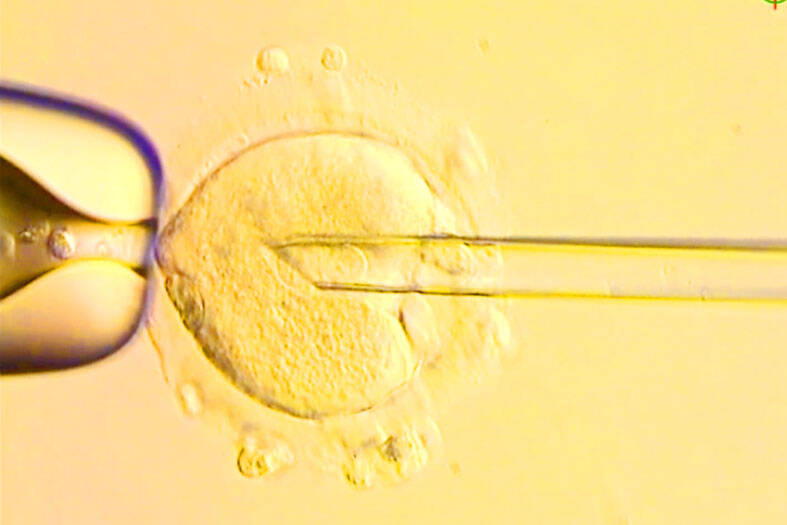Eight children in the UK were born using a new three-person in vitro fertilization (IVF) technique to avoid passing devastating genetic diseases to the children, scientists from Newcastle University reported on Wednesday.
The technique, which is banned in the US, transfers pieces from inside the mother’s fertilized egg — its nucleus, plus the nucleus of the father’s sperm — into a healthy egg provided by an anonymous donor.
The procedure prevents the transfer of mutated genes from inside the mother’s mitochondria — the cells’ energy factories — that could cause incurable and potentially fatal disorders.

Photo: Newcastle Fertility Centre, Newcastle Hospitals NHS Foundation Trust via AP
Mutations in mitochondrial DNA can affect multiple organs, particularly those that require high energy, such as the brain, liver, heart, muscles and kidneys.
One of the eight children is two years old, two are between ages one and two, and five are infants.
All were healthy at birth, with blood tests showing no or low levels of mitochondrial gene mutations, the scientists reported in the New England Journal of Medicine.
All have made normal developmental progress, they said.
The results “are the culmination of decades of work,” not just on the scientific and technical challenges, but also in ethical inquiry, public and patient engagement, law-making, drafting and execution of regulations, and establishing a system for monitoring and caring for the mothers and infants, said University of Oxford reproductive medicine specialist Andy Greenfield, who was not involved in the research.
The researchers’ “treasure trove of data” is likely to be the starting point of new avenues of investigation, Greenfield said in a statement.
Often during IVF screening procedures, doctors can identify some low-risk eggs with few mitochondrial gene mutations that are suitable for implantation, but sometimes all of the eggs’ mitochondrial DNA carries mutations.
In those cases, using the new technique, the British doctors first fertilize the mother’s egg with the father’s sperm. Then they remove the fertilized egg’s “pronuclei” — the nuclei of the egg and the sperm, which carry the DNA instructions from both parents for the baby’s development, survival and reproduction.
Next, they transfer the egg and sperm nuclei into a donated fertilized egg that has had its pronuclei removed.
The donor egg would begin to divide and develop with its healthy mitochondria and the nuclear DNA from the mother’s egg and the father’s sperm.
The process, detailed in a second paper in the journal, “essentially replaces the faulty mitochondrial DNA [mtDNA] with healthy mtDNA from the donor,” senior researcher Mary Herbert, professor of reproductive biology at Newcastle, told a news conference.
The procedure was tested in 22 women whose babies were likely to inherit such genes. In addition to the eight women who delivered the children described in the report, another one of the 22 is currently pregnant.

PRECARIOUS RELATIONS: Commentators in Saudi Arabia accuse the UAE of growing too bold, backing forces at odds with Saudi interests in various conflicts A Saudi Arabian media campaign targeting the United Arab Emirates (UAE) has deepened the Gulf’s worst row in years, stoking fears of a damaging fall-out in the financial heart of the Middle East. Fiery accusations of rights abuses and betrayal have circulated for weeks in state-run and social media after a brief conflict in Yemen, where Saudi airstrikes quelled an offensive by UAE-backed separatists. The United Arab Emirates is “investing in chaos and supporting secessionists” from Libya to Yemen and the Horn of Africa, Saudi Arabia’s al-Ekhbariya TV charged in a report this week. Such invective has been unheard of

US President Donald Trump on Saturday warned Canada that if it concludes a trade deal with China, he would impose a 100 percent tariff on all goods coming over the border. Relations between the US and its northern neighbor have been rocky since Trump returned to the White House a year ago, with spats over trade and Canadian Prime Minister Mark Carney decrying a “rupture” in the US-led global order. During a visit to Beijing earlier this month, Carney hailed a “new strategic partnership” with China that resulted in a “preliminary, but landmark trade agreement” to reduce tariffs — but

SCAM CLAMPDOWN: About 130 South Korean scam suspects have been sent home since October last year, and 60 more are still waiting for repatriation Dozens of South Koreans allegedly involved in online scams in Cambodia were yesterday returned to South Korea to face investigations in what was the largest group repatriation of Korean criminal suspects from abroad. The 73 South Korean suspects allegedly scammed fellow Koreans out of 48.6 billion won (US$33 million), South Korea said. Upon arrival in South Korea’s Incheon International Airport aboard a chartered plane, the suspects — 65 men and eight women — were sent to police stations. Local TV footage showed the suspects, in handcuffs and wearing masks, being escorted by police officers and boarding buses. They were among about 260 South

Chinese President Xi Jinping’s (習近平) purge of his most senior general is driven by his effort to both secure “total control” of his military and root out corruption, US Ambassador to China David Perdue said told Bloomberg Television yesterday. The probe into Zhang Youxia (張又俠), Xi’s second-in-command, announced over the weekend, is a “major development,” Perdue said, citing the family connections the vice chair of China’s apex military commission has with Xi. Chinese authorities said Zhang was being investigated for suspected serious discipline and law violations, without disclosing further details. “I take him at his word that there’s a corruption effort under